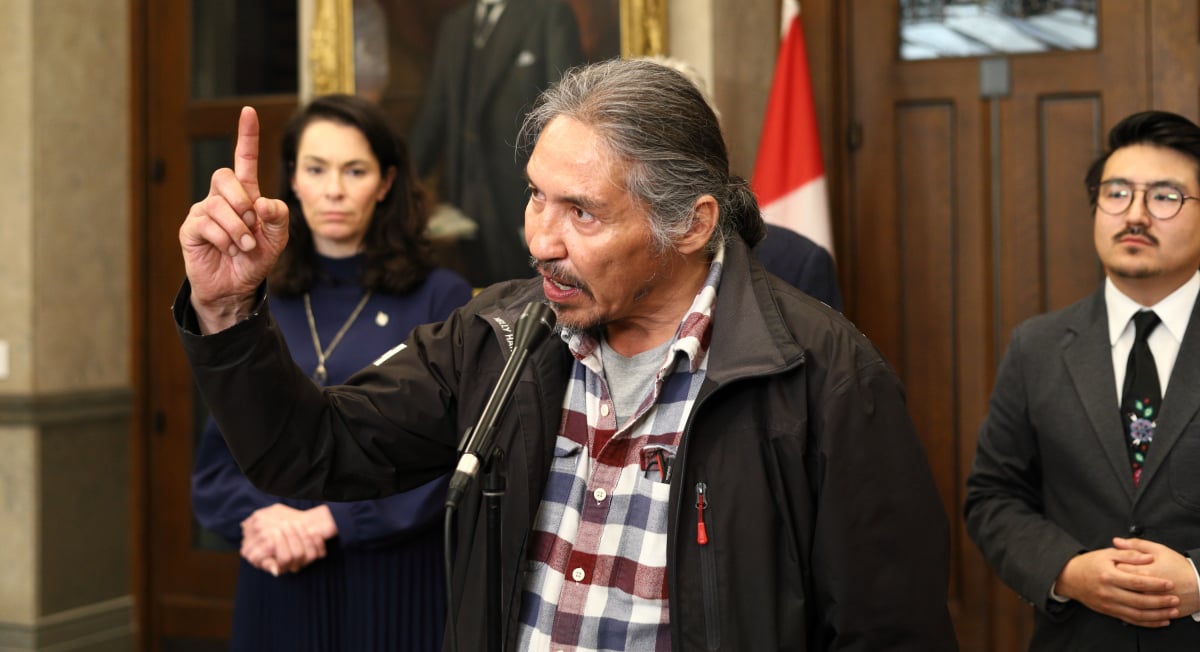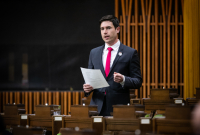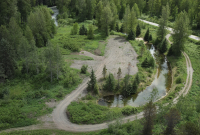Support strong Canadian climate journalism for 2025
The Alberta Energy Regulator's decision to issue a “ridiculously small” $50,000 fine to Imperial Oil in connection with major tailings leaks in 2023 sends a clear message to fossil fuel companies according to a local First Nation’s chief: “come here and dump all of your toxic waste in our drinking water.”
“The [AER] could have given them a stiffer fine, maybe $5 million to $10 million, to send a message to all of industry that they will not tolerate this. But they didn't do anything,” Athabasca Chipewyan First Nation Chief Allan Adam told Canada’s National Observer in a phone interview on Friday.
Imperial Oil made roughly $20 billion in profit over 2022 and 2023 combined, and reported $1.13 billion in profit in the second quarter of 2024.
“That $50,000, I think Imperial makes that in probably three seconds,” Adam said. (Adam is not far off; in the 2023/24 fiscal year the company made $50,000 in about 40 seconds.)
ACFN is suing the Alberta Energy Regulator for failure to notify the nation about two large leaks of toxic tailings from Imperial Oil’s Kearl site in northern Alberta. Adam has been at the forefront of the issue ever since the tailings leaks made international headlines last year.
“This ridiculously small fine shows that Alberta, with its weak regulations, is the problem,” he said.
ACFN is not the only community saying the AER didn’t go far enough.
“We feel that this penalty falls short of sending a strong and clear message to the oilsands industry regarding the imperative of accountability in environmental stewardship,” said Fort Chipewyan Metis Nation President Kendrick Cardinal in an emailed statement to Canada’s National Observer.
“The actions of industry players have far-reaching consequences that extend beyond immediate financial penalties; they impact our nation, and our Aboriginal rights,” Cardinal said, adding that the $50,000 fine should be the first step towards more rigorous enforcement by the regulator to ensure all industry participants adhere strictly to their regulatory responsibilities.
“It is crucial to recognize that the true ramifications of this incident may not become apparent for years to come,” Cardinal wrote.
When it first came to light in February 2023 that toxic tailings had been seeping from Imperial Oil’s Kearl site for nine months, local Indigenous communities were concerned and fearful that members had been harvesting and subsisting off the land without being notified. A lot of people in the community are “pissed off about it,” Adam added — himself included.
In the aftermath, Indigenous leaders including Adam criticized Alberta’s regulatory regime and lambasted the Alberta Energy Regulator for failing to protect people and the environment, calling it a captured regulator.
“Everybody says that the Alberta government will let industry do whatever they want, because they turned a blind eye and nobody wants to say anything about it, but it's happened to our people,” Adam said.
“It's chemical germ warfare … It's a silent killer that's killing our people,” he said, referring to the imminent threat posed by — and poor management of — more than 1.4 trillion litres of toxic oilsands tailings perched in man-made ponds near the Athabasca River.
(Mikisew Cree First Nation, which has also spoken out about the Kearl tailings leaks, did not respond to a request for comment by deadline. This story will be updated if and when comment becomes available.)
The federal government announced $12.5 million this month for a community-led study into the cumulative health impacts of the oilsands. For many years, ACFN and other groups had been raising the alarm on rare cancers found in the community and called for studies into the causes.
The Athabasca Chipewyan are bringing the tailings fight to the courts and in March served the AER president and CEO Laurie Pushor with a notice of a lawsuit.
“We'll take this and we will submit this as evidence that the Alberta government doesn't care about our people,” Adam said. “Everything that they do from here on in this just goes to the record to show their negligence towards our community … environmental racism is what it is.”
Adam hinted that the ACFN may continue to escalate the issue.
“We keep on talking to Alberta and Canada; it goes nowhere,” Adam said. “We'll take our message to the UN and we will tell the world about how this province of Alberta and Canada continues to treat our First Nations people here, because they tell everybody that the First Nations are doing good and there's nothing wrong. Well, here we are dealing with this kind of crap, and it has to be addressed.”
Natasha Bulowski / Local Journalism Initiative / Canada’s National Observer






Comments
On the AER website there is a main tab titled 'Protecting what Matters'.
If you click on that there are the following subheadings:
Holding Industry Accountable
Giving Albertans A Voice
Protection The Environment
Reporting On Our Progress
As if it wasn't outrageous enough that they failed to notify the nation about the large tailings leaks, the $50,000 fine issued by AER is a slap on the wrist with a wet noodle.
Regarding AER's website headings, someone convince me that we are not living in George Orwell's '1984'.
The minuscule $50,000 fine is yet another piece of evidence on how totally captured this province's institutions are by the oil & gas industry. A less expensive tar and feathering of the CEO would have had more impact.
Everywhere you look in the world, fossil fuel extraction, the epitome of predatory capitalism is destroying ecosystems, economies, the global environment, political and judicial rules and regulations and turning Earth into its exclusive toy, to destroy at its leisure. Life on earth, is the collateral damage of this rolling, thunderous engine of destruction. What will they do when fossil fuel finally runs out? Will there be any humans left who can finally turn off the pumps and shut down the wells?